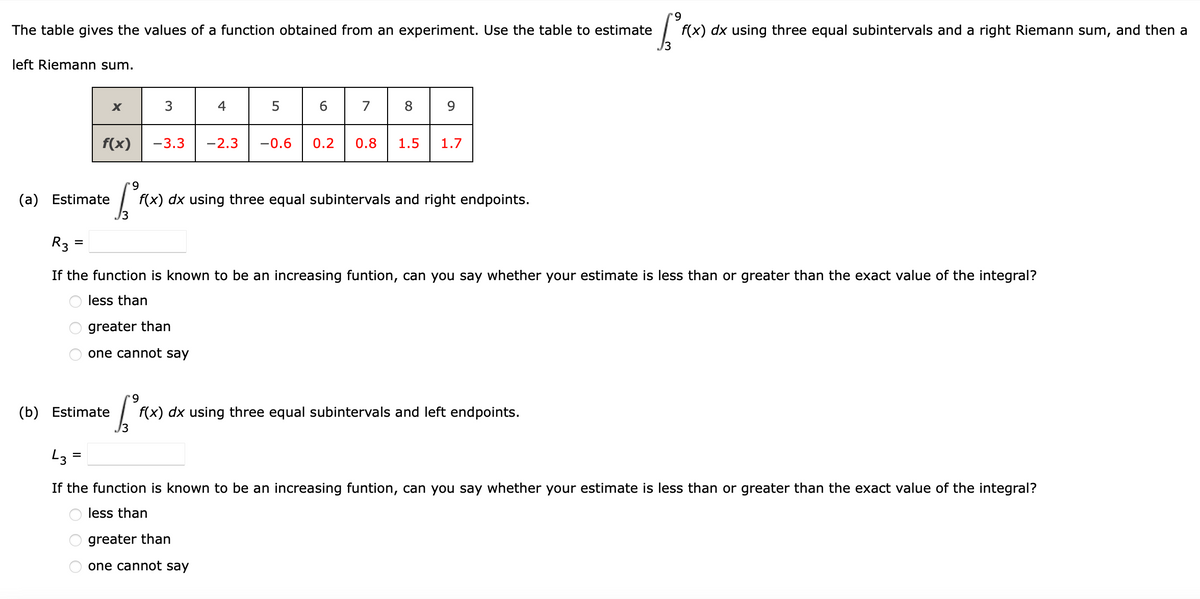The table gives the values of a function obtained from an experiment. Use the table to estimate f(x) dx using three equal subintervals and a right Riemann sum, and then a left Riemann sum. 3 4 5 6 7 8 9. f(x) -3.3 -2.3 -0.6 0.2 0.8 1.5 1.7 (a) Estimate f(x) dx using three equal subintervals and right endpoints. R3 = If the function is known to be an increasing funtion, can you say whether your estimate is less than or greater than the exact value of the integral? less than greater than O one cannot say (b) Estimate f(x) dx using three equal subintervals and left endpoints. L3 = If the function is known to be an increasing funtion, can you say whether your estimate is less than or greater than the exact value of the integral? O less than O greater than one cannot say
The table gives the values of a function obtained from an experiment. Use the table to estimate f(x) dx using three equal subintervals and a right Riemann sum, and then a left Riemann sum. 3 4 5 6 7 8 9. f(x) -3.3 -2.3 -0.6 0.2 0.8 1.5 1.7 (a) Estimate f(x) dx using three equal subintervals and right endpoints. R3 = If the function is known to be an increasing funtion, can you say whether your estimate is less than or greater than the exact value of the integral? less than greater than O one cannot say (b) Estimate f(x) dx using three equal subintervals and left endpoints. L3 = If the function is known to be an increasing funtion, can you say whether your estimate is less than or greater than the exact value of the integral? O less than O greater than one cannot say
Calculus: Early Transcendentals
8th Edition
ISBN:9781285741550
Author:James Stewart
Publisher:James Stewart
Chapter1: Functions And Models
Section: Chapter Questions
Problem 1RCC: (a) What is a function? What are its domain and range? (b) What is the graph of a function? (c) How...
Related questions
Question

Transcribed Image Text:9.
The table gives the values of a function obtained from an experiment. Use the table to estimate
f(x) dx using three equal subintervals and a right Riemann sum, and then a
left Riemann sum.
3
4
6.
7
8.
f(x)
-3.3
-2.3
-0.6
0.2
0.8
1.5
1.7
6.
(a) Estimate
f(x) dx using three equal subintervals and right endpoints.
R3 =
If the function is known to be an increasing funtion, can you say whether your estimate is less than or greater than the exact value of the integral?
less than
greater than
one cannot say
(b) Estimate
f(x) dx using three equal subintervals and left endpoints.
13
L3 =
If the function is known to be an increasing funtion, can you say whether your estimate is less than or greater than the exact value of the integral?
less than
greater than
one cannot say
O O O
O O O
Expert Solution
This question has been solved!
Explore an expertly crafted, step-by-step solution for a thorough understanding of key concepts.
This is a popular solution!
Trending now
This is a popular solution!
Step by step
Solved in 3 steps

Recommended textbooks for you

Calculus: Early Transcendentals
Calculus
ISBN:
9781285741550
Author:
James Stewart
Publisher:
Cengage Learning

Thomas' Calculus (14th Edition)
Calculus
ISBN:
9780134438986
Author:
Joel R. Hass, Christopher E. Heil, Maurice D. Weir
Publisher:
PEARSON

Calculus: Early Transcendentals (3rd Edition)
Calculus
ISBN:
9780134763644
Author:
William L. Briggs, Lyle Cochran, Bernard Gillett, Eric Schulz
Publisher:
PEARSON

Calculus: Early Transcendentals
Calculus
ISBN:
9781285741550
Author:
James Stewart
Publisher:
Cengage Learning

Thomas' Calculus (14th Edition)
Calculus
ISBN:
9780134438986
Author:
Joel R. Hass, Christopher E. Heil, Maurice D. Weir
Publisher:
PEARSON

Calculus: Early Transcendentals (3rd Edition)
Calculus
ISBN:
9780134763644
Author:
William L. Briggs, Lyle Cochran, Bernard Gillett, Eric Schulz
Publisher:
PEARSON

Calculus: Early Transcendentals
Calculus
ISBN:
9781319050740
Author:
Jon Rogawski, Colin Adams, Robert Franzosa
Publisher:
W. H. Freeman


Calculus: Early Transcendental Functions
Calculus
ISBN:
9781337552516
Author:
Ron Larson, Bruce H. Edwards
Publisher:
Cengage Learning